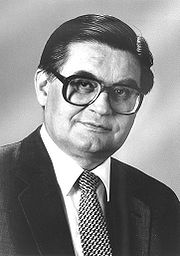
Hans Koschnick
Encyclopedia

Germany
Germany , officially the Federal Republic of Germany , is a federal parliamentary republic in Europe. The country consists of 16 states while the capital and largest city is Berlin. Germany covers an area of 357,021 km2 and has a largely temperate seasonal climate...
politician (SPD) and elder statesman. He was the President of the Senate
Senate of Bremen
The Senate of the Free Hanseatic City of Bremen is the government of the city-state of Bremen . The senate has existed since mediæval times. The senate is headed by a President, who also holds the title of Mayor. The President's deputy also holds the title Mayor...
and Mayor of the German city-state
City-state
A city-state is an independent or autonomous entity whose territory consists of a city which is not administered as a part of another local government.-Historical city-states:...
of Bremen
Bremen (state)
The Free Hanseatic City of Bremen is the smallest of Germany's 16 states. A more informal name, but used in some official contexts, is Land Bremen .-Geography:...
from 1967 to 1985 and afterwards served as a member of the Bundestag
Bundestag
The Bundestag is a federal legislative body in Germany. In practice Germany is governed by a bicameral legislature, of which the Bundestag serves as the lower house and the Bundesrat the upper house. The Bundestag is established by the German Basic Law of 1949, as the successor to the earlier...
, the German federal parliament, from 1987 to 1998.
Between 1994 and 1996, Koschnick was the EU administrator of Mostar
Mostar
Mostar is a city and municipality in Bosnia and Herzegovina, the largest and one of the most important cities in the Herzegovina region and the center of the Herzegovina-Neretva Canton of the Federation. Mostar is situated on the Neretva river and is the fifth-largest city in the country...
.
Early years
Koschnick grew up in the Gröpelingen neighborhood of Bremen. His childhood was shaped by his parents' activism. His father, who was a trade unionTrade union
A trade union, trades union or labor union is an organization of workers that have banded together to achieve common goals such as better working conditions. The trade union, through its leadership, bargains with the employer on behalf of union members and negotiates labour contracts with...
ist and official of the Revolutionäre Gewerkschafts-Opposition, was arrested on the evening of May 1, 1933, the day before the Nazis stormed union offices all over Germany. He was charged with high treason
High treason
High treason is criminal disloyalty to one's government. Participating in a war against one's native country, attempting to overthrow its government, spying on its military, its diplomats, or its secret services for a hostile and foreign power, or attempting to kill its head of state are perhaps...
for having organized a May Day
May Day
May Day on May 1 is an ancient northern hemisphere spring festival and usually a public holiday; it is also a traditional spring holiday in many cultures....
rally and made a speech and was sent to a zuchthaus and then Sachsenhausen concentration camp
Sachsenhausen concentration camp
Sachsenhausen or Sachsenhausen-Oranienburg was a Nazi concentration camp in Oranienburg, Germany, used primarily for political prisoners from 1936 to the end of the Third Reich in May, 1945. After World War II, when Oranienburg was in the Soviet Occupation Zone, the structure was used as an NKVD...
, before being released "on leave" in 1938. In 1943, he was drafted into military service and the next year, sent to Finland.
His mother was arrested for acting as a courier between several German Resistance
German Resistance
The German resistance was the opposition by individuals and groups in Germany to Adolf Hitler or the National Socialist regime between 1933 and 1945. Some of these engaged in active plans to remove Adolf Hitler from power and overthrow his regime...
groups and spent one year. She refused to join the German Labour Front
German Labour Front
The German Labour Front was the National Socialist trade union organisation which replaced the various trade unions of the Weimar Republic after Adolf Hitler's rise to power....
(DAF) and "learn" the Hitler greeting, causing her to frequently lose her job until she finally secured a position as a sugared goods sales clerk and was relatively removed from DAF spot checks. These interruptions were combined with constant absences, so Koschnick grew up with his grandparents.

